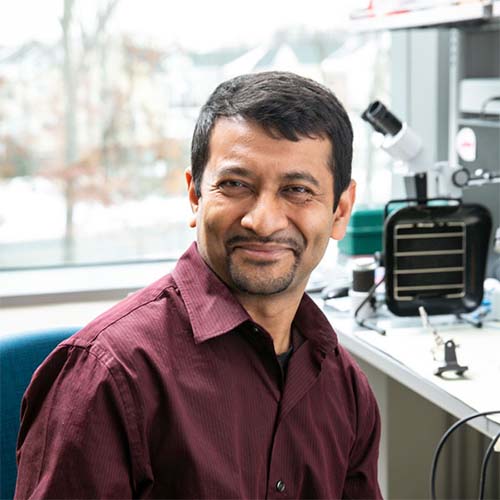
Distinguished University Professor, Department of Bioengineering
Contact Information
Campus: Fairfax
Building: Peterson Hall
Room 3303
Mail Stop: 1J7
Personal Websites
In the News
- September 30, 2025
- April 22, 2025
- March 29, 2025
- July 9, 2024
- April 16, 2024
Biography
Siddhartha Sikdar is a distinguished university professor in the Department of Bioengineering at George Mason University. He is the co-director of the Center for MedTech Innovation (CMI). This transdisciplinary center includes faculty with expertise in engineering, neuroscience, and rehabilitation. The vision for CMI is to improve the function and quality of life of individuals living with physical and psychosocial disabilities through research on mechanisms and modulation of complex adaptive systems underlying human movement and behavior.
Sikdar’s research group within CMI conducts translational research using imaging to investigate brain-body interactions in several clinical conditions of major public health significance, such as chronic pain, stroke, spinal cord injury, and amputation. The group uses state-of-the-art ultrasound and laser instrumentation for developing new ultrasound, optical, and hybrid imaging techniques, and assistive technologies. The group is currently investigating the novel use of wearable ultrasound sensors for sensing muscle activity and controlling external devices such as multi-articulated prosthetic hands and exoskeletons.
Sikdar earned his PhD in Electrical Engineering from the University of Washington, Seattle in 2005. He received a postdoctoral fellowship from the American Heart Association. He has been a recipient of the NSF CAREER Award, the Volgenau School of Engineering Rising Star Award, Mason’s Emerging Researcher/Scholar/Creator Award and was nominated for the Rising Star Faculty Award of the State Council of Higher Education in Virginia. His current research is funded by the National Science Foundation, the National Institutes of Health, the Department of Defense, and the Veteran's Administration.
Research Spotlight:
Bioengineering professor Siddhartha Sikdar, co-director of the Center for MedTech Innovation (CMI), uses cutting-edge ultrasound technology to help people gain greater control of prosthetic devices for their arms, hands, and legs. The successful completion of this research will lead to the first human evaluation of an integrated prototype that uses low-power portable imaging sensors and real-time image analysis to sense residual muscle activity for prosthetic control. Watch the video below.
Degrees
- PhD, Electrical Engineering, University of Washington
- MS, Electrical Engineering, University of Washington
- BS, Electrical Engineering, Indian Institute of Technology, Kanpur
Research Interests
Biomechanics, Assistive Technology, Biomedical Imaging, Musculoskeletal Modeling, Neuroengineering, Neuroprosthetics, Rehabilitation Engineering, Sensorimotor Integration, Ultrasound
Publications
Research
Active Funding
National Science Foundation EEC 1840339 (PI: Siddhartha Sikdar)
- 09/01/18-08/30/19, Funded amount: $100K;
- Role: PI
- Title: Planning Grant: Engineering Research Center for Technology-Empowered Communities of Recovery (TECOR)
National Institutes of Health 1R41NS107149-01A1 (PI: Richard Black)
- 08/31/18-08/30/19, Funded amount: $150K;
- Role: Mason PI
- Title: Sonomyographic Control of Fiber-optically Sensorized Prosthetic Fingers for Graded Force Actuation
Department of Defense CDMRP W81XWH-16-1-0722 (PI: Siddhartha Sikdar)
- 09/30/16-09/29/19, Funded amount: $999K;
- Role: PI
- Title: Intuitive Control of Upper-Extremity Prostheses Using Novel Ultrasonic Sensing of Residual Muscle Activity
National Science Foundation BCS 1625656 (PI: James Thompson and Siddhartha Sikdar)
- 09/01/16-08/31/19, Funded amount: $1.65 M
- Role: co-PI
- Title: MRI: Acquisition of a 3T MRI for Integrative Brain-Body Imaging
National Science Foundation CNS 1646204 (PI: Siddhartha Sikdar)
- 01/01/17-12/31/20, Funded amount: $400 K;
- Role: Lead PI
- Title: CPS: Synergy: Collaborative Research: Closed-loop Hybrid Exoskeleton Utilizing Wearable Ultrasound Imaging Sensors for Measuring Fatigue
National Science Foundation CNS 1526913 (PI: Houman Homayoun)
- 10/01/15-09/30/19, Funded amount: $287 K;
- Role: Co-PI
- Title: CSR: Small: Collaborative Research: Heterogeneous Ultra Low Power Accelerator for Wearable Biomedical Computing
Veterans Health Administration Merit Grant CSRD (PI: Brajesh Lal; Mason PI: Siddhartha Sikdar)
- 07/01/17-06/30/21, Funded amount: $400K;
- Role: PI at George Mason University
- Title: Asymptomatic Carotid Stenosis: Cognitive Function and Plaque Correlates (ACCOF-2)
Completed Funding
National Science Foundation CNS 1329829 (PI: Siddhartha Sikdar)
- 02/01/14-01/31/19, Funded amount: $995 K;
- Role: PI
- Title: CPS:Synergy: A Novel Biomechanical Interface Based on Dynamic Imaging Sensors
National Institutes of Health R01 1R01AR057348 (PI: Siddhartha Sikdar)
- 04/01/10-03/31/15; Funded amount: $1.974 M;
- Role: PI
- Title: Pathogenesis and Pathophysiological Mechanisms of Myofascial Trigger Points
National Science Foundation CAREER 0953652 (PI: Siddhartha Sikdar)
- 05/01/10-04/30/16, Funded amount: $400K;
- Role: PI
- Title: An Integrated Systems Approach to Understanding Complex Muscle Disorders
